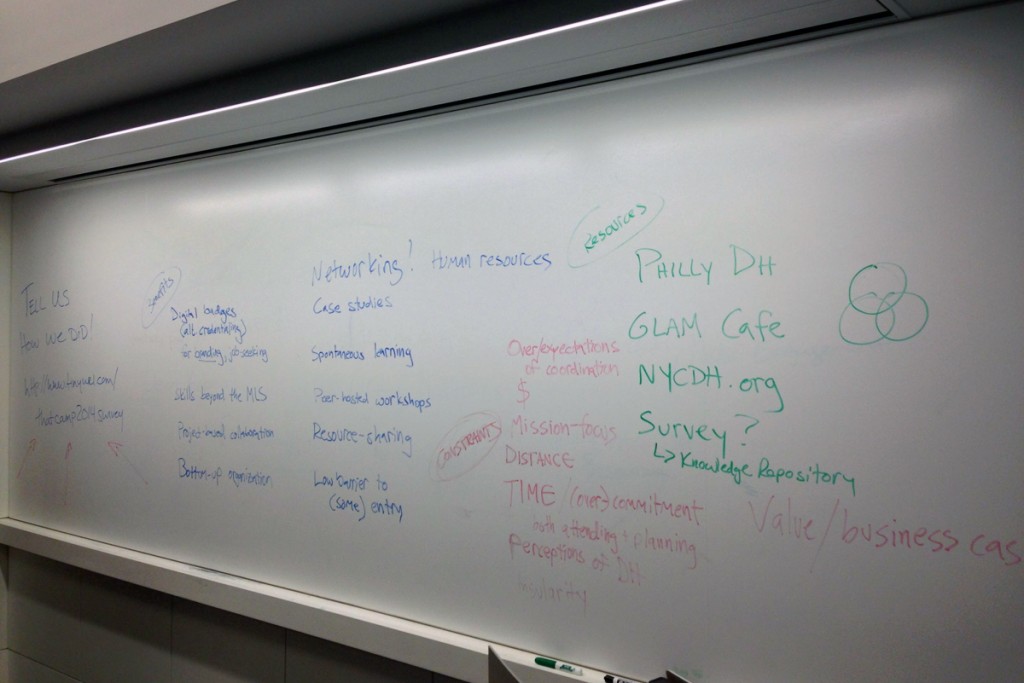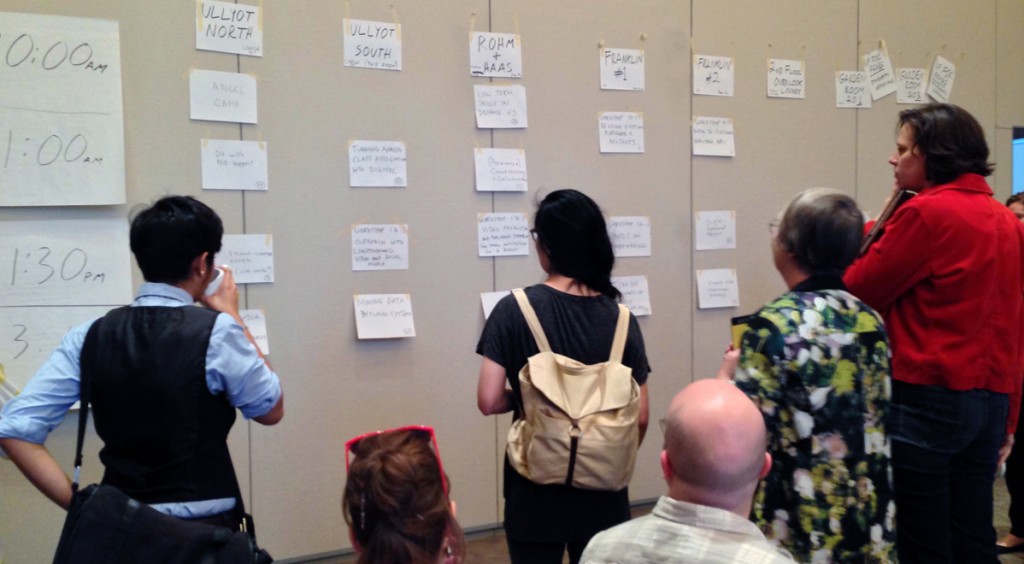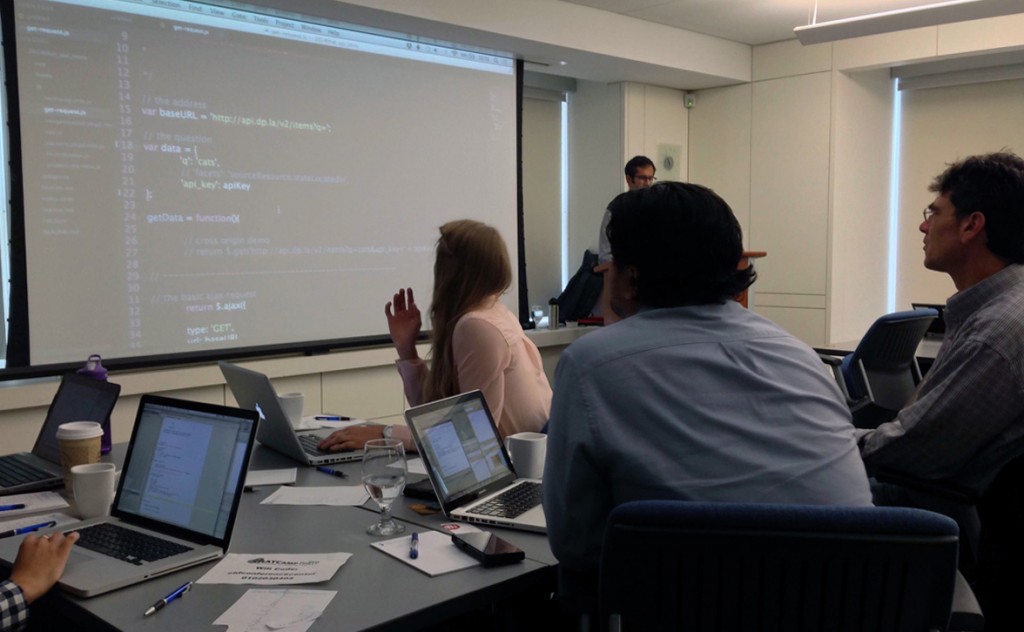Karl here. Last month I made the trip back down to my hometown of Philadelphia to attend THATCampPhilly, a day of meet-ups among technologists and humanists organized under the broad supervision of local digital humanities interest group PhillyDH. In the “unconference” model, a handful of technical workshops were prearranged, but the event was open to proposals for less formal talks and discussions leading right up to and throughout the morning convocation, and provided attendees opportunities to network over lunch, cocktails, and dinner in Philadelphia’s historic Old City neighborhood. Over 100 attended the conference, including representatives from the city’s central anchor institutions like the University of Pennsylvania, Drexel University, and our host, the Chemical Heritage Foundation (CHF), as well as those from regions as peripheral as Delaware, DC, and the Lehigh Valley.
Workshops
In the morning I attended an introductory training in APIs for cultural heritage organizations. Nabil Kashyap, Librarian for Digital Initiatives and Scholarship at Swarthmore College, taught attendees the very basics of JavaScript and how to use it to query the vast metadata store compiled by the Digital Public Library of America (DPLA). Using just our laptops, their text editors and browsers, we learned how to identify ourselves to DPLA’s API, how to structure and send a request for its data, and ultimately how to interpret and render what we receive back for use on our organizations’ web instances. While I had used JS very briefly for web design, this was my first experience issuing proper cURL and Ajax requests with a command line interface. Getting all of the ~20-25 participants up to this same speed was tricky of course; the myriad contextual conditions necessary to consistently render everyone’s results pretty neatly reflected the problem of capturing the same kind of dynamic script-generated content that my host institution NYARC needs to archive regularly.
In the afternoon I attended a video production workshop led by Nicole Scalessa, IT Manager at the Library Company of Philadelphia. Having a background in film industry standard hardware and software resources, I was eager to learn for the first time about low- and no-cost alternatives feasible to non-profit ventures and others on tight budgets. Scalessa led participants in hands-on planning and budgeting for social media campaigns that rely heavily on audio and video, and walked us through the process of creating web quality products with the free tools like the audio editing suite Audacity and video editing platform Lightworks, among others. As I get more comfortable with these software tools in particular, through practice and through a little application here on the blog, I’d love like to coordinate a similar education session in New York, so let me know if you’re interested!
Unconference sessions
In the morning I attended an impromptu discussion group considering the persistent issue of leading digital humanities projects without formal institutional support–no support, as session facilitator Jerry Yarnetsky, Emerging Technologies Librarian at Montgomery County Community College, framed it. This quickly became a discussion of participants’ personal experiences with low/no-cost software for content management and/or data storage. Several of us used the opportunity to remind our peers of the importance of investing in software and services that support exporting our previous digital objects to open source or at least industry standard file formats and wrappers–of having an ‘exit strategy’ for our data.
When I asked for examples, a few participants shared their experiences seeking/achieving buy-in from bodies outside of their institutions, but for the most part there was ambivalence about organizations or projects that enable resource sharing among institutionally under-supported efforts.
Suppose we were to build a hub for digital humanities resource sharing in the Mid-Atlantic region from scratch–what would it look like? Maybe something like METRO, I thought, but I proposed an unconference session for the last timeslot of the day to brainstorm exactly what such an organization would provide. About 25 attendees participated in the discussion. In general, they expressed their appreciation for grassroots and spontaneous learning opportunities that relate directly to their active projects, connect them with resourceful professionals within the digital humanities network, and promote alternative forms of credentialing beyond the PhD/MLS. They also, however, felt constrained by geographic dispersion, lack of time to plan or attend more events, and the perceptions of digital humanities both within their institutions and in our own community when it lacks a compelling business case or ‘value story.’ A desire to better understand the full community of institutions and practitioners that fall under the regional digital humanities umbrella and their respective skills–a thorough needs and resources assessment–abounded.

My live whiteboard scribblings from the discussion of existing and aspirational resources for the local digital humanities community
Play
Of course I couldn’t let the day pass without connecting with others striving to steward web culture to future generations with NYARC’s own chosen software service, Archive-It. Over lunch, archivists from CHF, Temple University, and the Presbyterian Historical Society shared with me the technical challenges that they regularly face and their plans to organize locally for more collaborative solutions. Again, you can expect to see something similar pop up in New York very soon!
The day ended with a lovely reception at Old City’s historic Physick House, where the combination of the day’s fun and a few adult beverages left everyone inspired and optimistic about future collaborations. The conversations started at the above workshops, discussions, and hallway encounters continue through rapidly circulating Google docs and on Twitter (#THATCampPhilly), so like any good summer camp experience, everyone made a lot of new friends and came away a good bit wiser.


